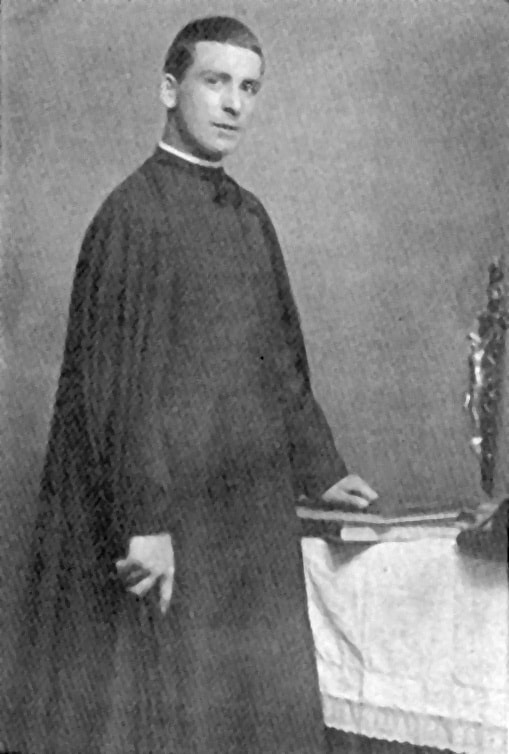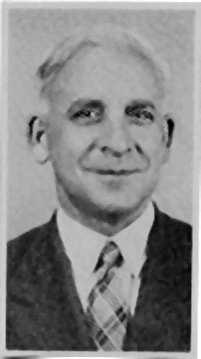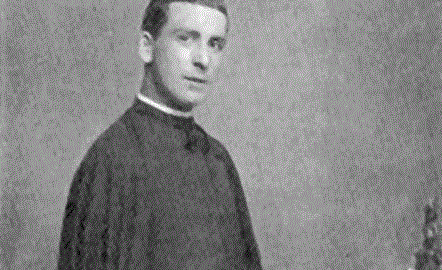From Roman Priest to Radio Evangelist – Manuel Garrido Aldama
God Meant It for Good

Often we may look back on our lives and wonder why certain things happened to us in life’s journey. God’s Word says “For as the heavens are higher than the earth, so are my ways higher than your ways, and my thoughts than your thoughts” (Isaiah 55:9).
You know it is good to hear what God has done in people’s lives. The testimony of one who has been saved by God’s grace (through the finished work of the Lord Jesus Christ, and who lives this Christian life by God’s power) is dynamic. We say in Spanish: Las palabras mueven, el ejemplo arrastra (Words move; example draws). My having been a Roman Catholic priest gives my testimony a peculiar aspect, which, I hope, will strengthen the faith of believers and bring others to living faith in Jesus Christ, whom I serve.
I was born of long Basque ancestry, in a typical Roman Catholic family in the north of Spain. The Basques have the reputation of being the strictest and most devout of all the Spanish people. We were a family of six boys and one girl; she was the youngest of all. My father, a lawyer, intended that we should have the best education. My mother, a fervent Roman Catholic, took care of our strict religious life.
For My Mother’s Sake
During his regular pastoral visits to my parent’s home, the priest would remind my mother that her six children had been given to her by God, and it was for her to show her gratitude by giving at least one of them to serve at the altar. “If you love your children, give them the greatest honor a mother can give her boys. The greatest honor is the priesthood,” he used to say to my mother. It is no wonder that she, being of such religious tendencies, and so devout, thought that it was really her duty to dedicate some of her boys to God in the priesthood. My father, although not anti-religious, paid little heed to the priest’s advice to my mother, for he was not of the same opinion. He wanted to have his boys follow some secular profession. I would not have been allowed to study for the priesthood had not my father died just then, when I was ten years of age. It did not take my mother long to make the necessary arrangements to have me accepted into the seminary, and some months afterward, when I was scarcely eleven years of age, I was taken to the minor seminary in Madrid. I promised my mother that I would do my best, for I would not have displeased her willingly for anything on earth.
Minor Seminary from Eleven Years Old
But how could a boy of eleven years of age understand the meaning of the priesthood? Rome maintains that “once a priest always a priest,” and such a lot was cast on me at the impressionable age of eleven years and under the pressure of a loving mother.
During my training, things went quite easily for the first six or seven years, but they began to change when we came to the study of the dogmas of the Church. The classes of theology were conducted in Latin, and at the end of every class the professor, who had received his D.D. in Rome, gave the students an opportunity of presenting questions, or putting objections, or asking for a better explanation of some of the points which he had treated in his lecture.
Is God Not Just?
When we came to the dogma of the “infallibility” of the pope, I decided to put a question to him, not with the object of denying anything, but in order that he might help me to reconcile the justice of God towards man with the declaration of this dogma in the Church some years previously. My argument was that God was making salvation more and more difficult for man as the years went by, and this did not seem to me to be very just on the part of God. Why was it that men could be saved and go to heaven before the year 1870 without believing this dogma, and we that were living after that could not be saved if we did not believe in it. Does it not imply injustice on the part of God to place additional obstacles before men every few years in order that they might obtain salvation? God is not just, if to enter heaven I have to overcome greater doctrinal difficulties than my ancestors.
I could see that the professor did not like my raising such questions. When on another occasion I sought further enlightenment, he answered me in an irate manner. “If you do not refrain from your dangerous ways of thinking, some day you will be a heretic.”
I recall another incident regarding one of my professors in the seminary, whom we very often saw walking up and down the corridors with his New Testament, studying and meditating on it. When he preached, he always preached Christ; he never mentioned the saints, and in one of his classes he said more than once, “I am afraid we are in the wrong somewhere. The Christ we know is not the Christ represented to us in the New Testament, and that may be the reason our preaching appeals so much to the feminine sentiment, while the men keep away from us.” He, no doubt, knew something of the truth as it is in Christ Jesus, but was afraid to be outspoken.
The time had arrived for me to be ordained a priest, and I was not very happy about it, in spite of all the importance attached to ordination and all the honors I was supposed to receive. My faith in the Church, and even in God, had been on the decline for a good while.
Ordination and My Mother’s Joy
The ceremony of ordination took place in Madrid. My mother and other members of the family had come for the unique occasion. My fellow students and I were ordained with the elaborate ritualism and sumptuous pomp that Rome’s experts have arranged for such causes. Some days after the ordination, I said my first Mass and administered the communion to my own mother and sister. I could see the tears running down my mother’s cheeks, and I myself could not help feeling the extraordinary emotion that such a ceremony was intended to produce.
Men As Mice
After some months of relaxation and enjoyment of home life, I managed to secure a post in one of the colleges in the north of Spain, in the Province of Santander. I was engaged in teaching Spanish literature; also I was obliged to say Mass every day and occasionally was invited to hear confessions. Since, according to the dogma of transubstantiation, I had God in my hands every day and since I saw men and women coming to me for confession, I began to drift further and further away from God. There were men who were as strong as an oak, kneeling before me at the confessional box but shaking with fear as if they were little mice. They did not feel like confessing their sins, and they did not know how to do it, but they feared the eternal punishment with which they were threatened if they did not come to confession at least once a year. Men of labor, as these were, did not know how to commence, so they would say, “Father, help me by asking me some questions,” and I had to review the sinful acts that I felt men of their position might commit. In spite of my state of unbelief in the power of men to forgive sins, I never refused to pronounce the formula of absolution to any one who came to me in good faith.
Trapped by Our Position
There were other priests, connected with the school in which I was teaching, with whom I naturally came into close friendship. On more than one occasion I asked them, “Do you really believe that because we say to a piece of bread, ‘This is my body,’ or because we say to a sinner, ‘I absolve thee,’ the bread is turned into the body of Christ and the sinner has his sins forgiven?” I remember very well one of them answering, “Why do you bother about those things? We are in this position and cannot help it now. We can do nothing about it.” By then I had resolved to leave the priesthood. I did not have the courage to face the opposition and consequent ostracism which would have been my lot had I given up the priesthood in Spain. I knew that in many places my very life would have been endangered, so I decided to leave Spain in order to carry out my convictions. For a time, I had another teaching job in North America. Then, on my return to Spain, I found the religious surroundings unbearably narrow and oppressive.
In London, I found circumstances the most favorable for leaving the Roman Church. I was fairly popular with the pupils and in no need of the support of the Church. Therefore, I decided to separate there and then. So, I dispatched a notice to the Roman Catholic authorities in London, advising them of my resolution and asking them to appoint someone in my place. In this apparently easy way, I realized a desire that had been in my heart for several years. I thought I had rid myself at last of all religion. It was not so, however. God had his plan to draw me unto Himself.
Faith in Christ Alone
A minister of the Church of England, a real man of God, hearing of my spiritual predicament became interested in me and invited me to converse with him on religious matters. He endeavored to show me the truth, not just because I had given up the Church of Rome, but because I thought that by doing so I had done away with all religion in my life, and with God in particular. In our conversations he would always conclude, “In spite of all your studies, there is one thing you do not know and one thing you lack; you do not know Christ as your Savior, and you do not have Him in your heart.” I could not help admiring the sincerity of the man as well as his earnestness, and I had to admit that I had never before heard God’s plan of salvation as he was now telling me: that I needed to know Christ in a real way, and have heartfelt faith in Him, and that Jesus Christ had paid the price of my sin in full, and it was a finished work.
“Now to him that worketh is the reward not reckoned of grace, but of debt. But to him that worketh not, but believeth on him that justifieth the ungodly, his faith is counted for righteousness. Even as David also describeth the blessedness of the man, unto whom God imputeth righteousness without works. Saying ‘blessed are they whose iniquities are forgiven and whose sins are covered’” (Romans 4:4-7).
The minister repeated God’s plan of salvation to me many times, until God in His grace gave spiritual light to my spirit. I began to have a new hunger for the things of God. From where it came, I know not. I can only say that I was being touched by God and drawn to Him.
Effectual Prayer
One Saturday afternoon the minister invited me to his home, and after speaking to me on the same subject, took me into an adjoining room where some members of his church were meeting for prayer. I was greatly surprised when I heard them praying for me. Their interest in my spiritual welfare was quite evident. The pastor had told them about me, and they had met there solely for my sake. I felt that Christ was very real to them. They spoke to Him as if He were really present among them. This was a totally new experience for me. I never thought that men and women could call on God so fervently and spontaneously as those people did. Prayer for Roman Catholics, even for the priests, consists almost exclusively in the mechanical recitation of certain formulas written by the Church—or by some person who has felt like putting his own feelings toward God or the saints into writing—for the help of those who might want to use them.
God Gives Me Faith
Deep spiritual conviction came upon me, and God gave me faith in Christ and a heart to repent. I could not help but pray earnestly to God, “God, it is true that Jesus Christ saves and brings peace to the soul, I want Him to draw near and give it to me.” I did not know exactly what was happening within me, but the doubts, and spiritual darkness, which had troubled me for so long – vanished, and I experienced a peace and tranquility, the like of which I had never known before. The Lord had accomplished His purpose. I had “passed from death unto life.”
“Therefore being justified by faith, we have peace with God through our Lord Jesus Christ” (Romans 5:1). “In whom we have redemption through his blood, the forgiveness of sins, according to the riches of his grace” (Ephesians 1:7).
It is Not Good That a Man Should Be Alone
Not long after my conversion, I met a lady, who later became my wife. She had been a pupil in one of my Spanish groups. Later on, when I proposed marriage to her, she refused at first on the ground of the Roman Catholic saying, “Once a priest, always a priest.” She was a Catholic, though no longer in communion with the Church. Finally, she accepted on condition that I would never ask her to accept the Protestant faith. “I will never go over to the enemy’s camp,” she used to tell me. I knew, however, that if Christ’s grace had been powerful enough to bring me to Him, He would also save her, and He did. Leading her from the errors of Romanism was not difficult, and the Lord also drew her to Himself. I later learned it is not right that a Christian marry an unbeliever. The Scripture commands us not to bind ourselves to unbelievers. “Be ye not unequally yoked together with unbelievers: for what fellowship hath righteousness with unrighteousness? and what communion hath light with darkness?” (2 Corinthians 6:14) Marriage is the ultimate binding in human relationships. “Therefore shall a man leave his father and his mother, and shall cleave unto his wife: and they shall be one flesh.” (Genesis 2:24) Though my wife became a Christian, there is absolutely no guarantee that this will happen in every marriage.)
The Need for the Gospel


I began to have a burden from the Lord for Spain and the Spanish-speaking world. In time, the Lord led me as an evangelist to a radio ministry in South America called “The Voice of the Andes.” Quite a number of Roman Catholics came to Christ through this.
I believe we need to get the Gospel out, “for it is “the power of God unto salvation to everyone that believeth” (Romans 1:16), and to utilize every means of propagating the Gospel, and meeting the spiritual needs of this dying world. “So then faith cometh by hearing and hearing by the word of God” (Romans 10:17).


